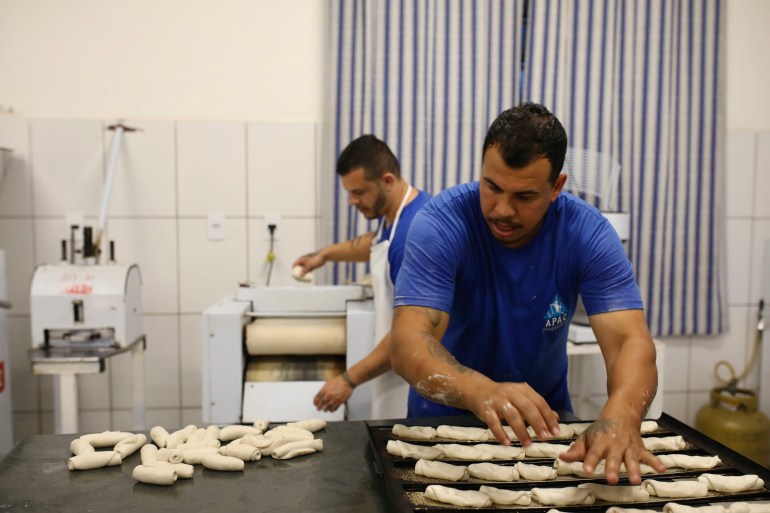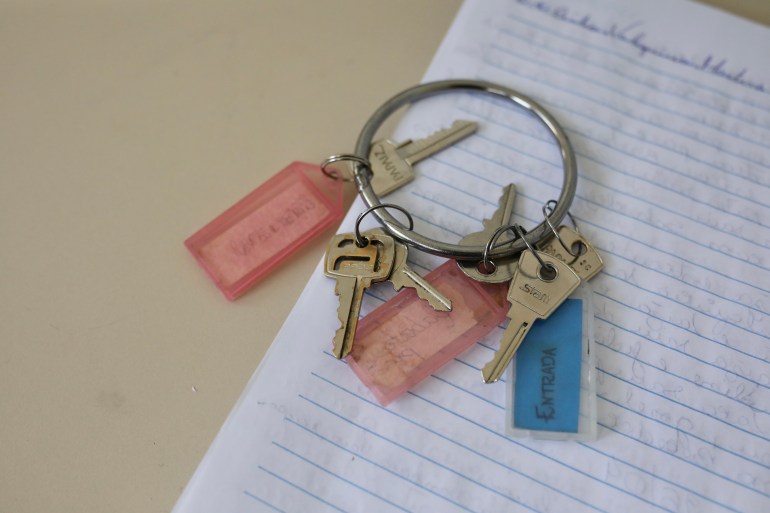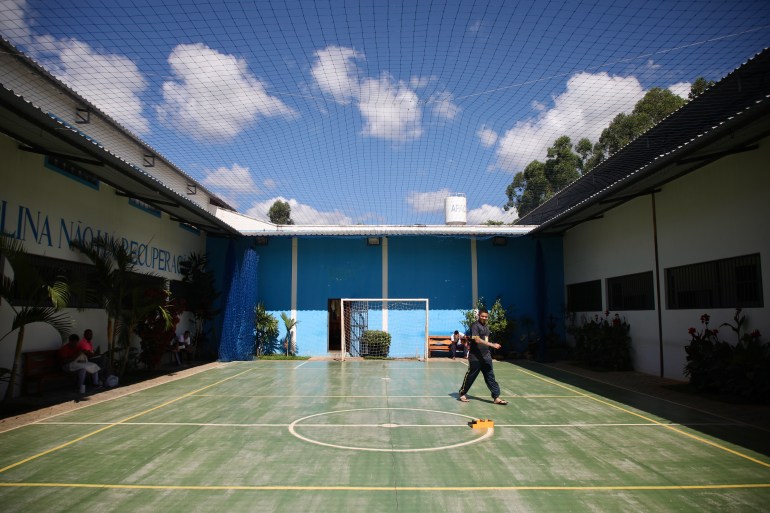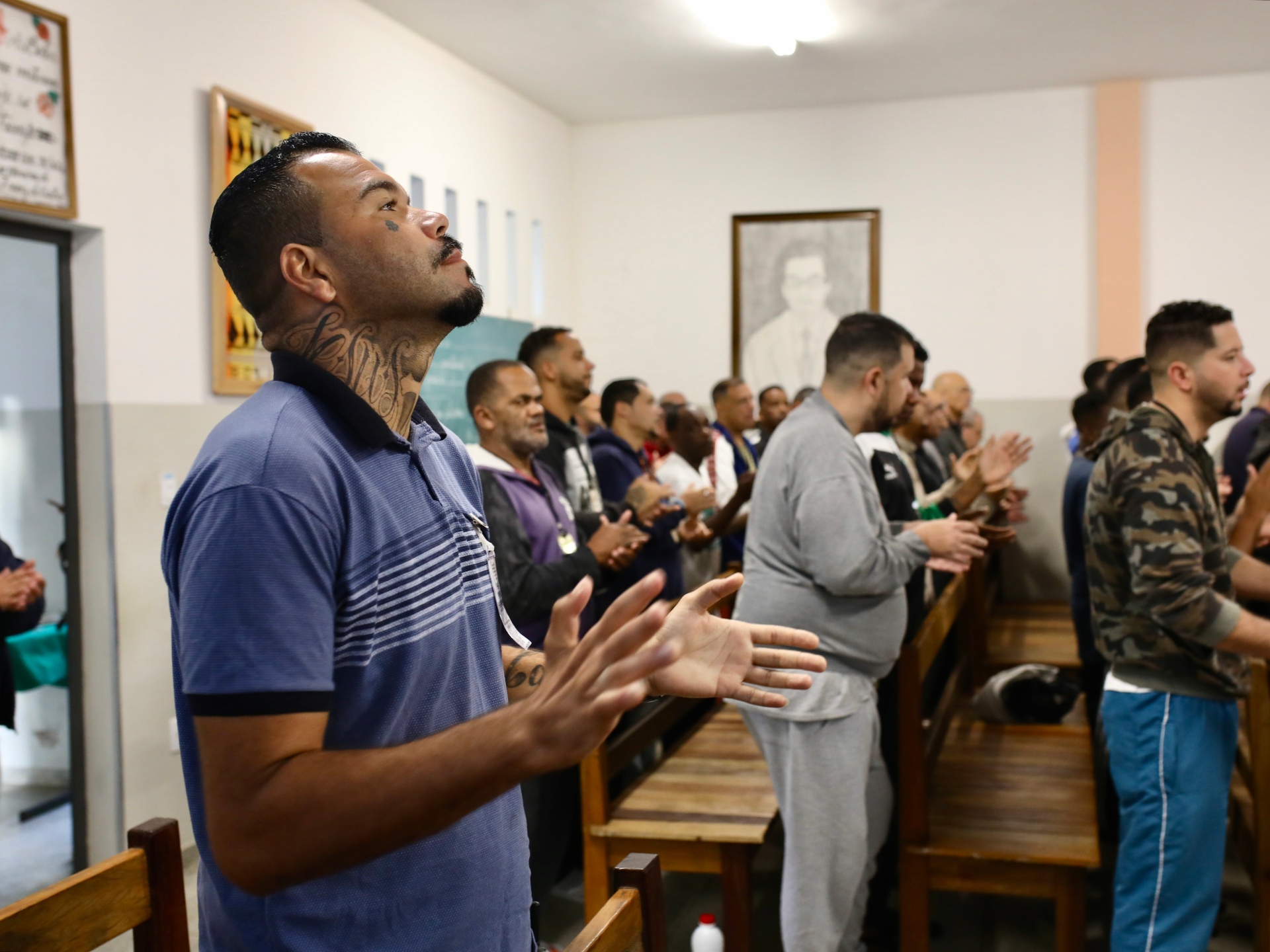Sao Joao del-Rei, Brazil – When Israel Domingos was convicted of drug trafficking four years ago, the 34-year-old Brazilian never imagined he would ultimately end up in a prison where he would be handed the keys – and choose not to run away.
“Before I came here, all I could think about was escaping from jail,” he told Al Jazeera during a recent tour of the prison in the eastern Brazilian city of Sao Joao del-Rei. “I saw myself on the street, a gun in my hand, making money from large amounts of drugs.”
Now, Domingos says he wants to return to the prison, run by the Association for Protection and Assistance of Convicts (APAC), to be a social worker after he completes his sentence. He was moved to the APAC facility after a year in regular prison.
APAC, a Brazilian non-profit that advocates for better treatment of prisoners, has a unique model in the dozens of facilities it manages across the country. Inmates oversee security and discipline, make their own food and wear their own clothes. Referred to as “recovering persons”, prisoners are called by their name rather than by a number.
The more than 400 inmates in the Sao Joao del-Rei APAC facility have the keys to their own cells – and unlike in a typical prison, there are no armed guards monitoring their movements.

This is a far cry from the norm in Brazil, where the total prison population exceeds 800,000. The country’s human rights ministry has cited inhumane conditions, including rotten food and torture, inside prisons in the state of Rio Grande do Norte, which led to deadly rioting this past March.
In 2021, a report from the Inter-American Commission on Human Rights said that across Brazil, inmates were “often held in overcrowded and structurally deficient prisons, maltreated, and frequently subjected to torture”.
In APAC prisons, cells appear clean, food is fresh and education is part of the rehabilitation programme. In terms of recidivism, while the Brazilian state reports its national average at 39 percent after five years – a number much lower than the 80 percent cited by international observers – APAC says its facilities have a rate of around 14 percent.
Leonardo Henrique, who is serving a 19-year sentence for drug trafficking, said that after being treated with dignity at the APAC facility in Sao Joao del-Rei, he renounced crime.
“My dream is to work as a judicial assistant with a judge that doesn’t believe in recovery, to show him that yes, it does work,” Henrique told Al Jazeera.

‘Waste of time and life’
Denio Marx, an international relations manager with the International Center for the Study of the APAC Method, an organisation that assists with research and training at these facilities, said convicts of all types of crimes were accepted, although drug-related offenders were the most prevalent.
Before a judge can send inmates to the state-funded APAC facilities, they must first spend time in regular prison, to which they can be returned if they fail to adapt to the APAC system. This serves as an incentive for compliance, Antonio Fuzatto, president of the APAC facility in Sao Joao del-Rei, told Al Jazeera.
But one inmate said if he had been shipped to an APAC jail right away, rather than spending three years in regular prison, he would have made more progress towards his ambitions and educational goals.
“[Standard prison] was a waste of time and life,” Alisson, who spoke on condition that his last name be withheld, told Al Jazeera.
According to Marx, however, these facilities are meant to run “side by side” with regular prisons. Concerns over corruption among local officials in some cities, along with limited resources, have stymied efforts to further expand the APAC system, he told Al Jazeera – but at the same time, the methodology has continued to gain traction around the world, from Germany to South Korea.
Some are critical of the approach. Fernanda Prates, a law professor at Brazil’s Getulio Vargas Foundation, said it ran the risk of legitimising the carceral system in general. “We should be thinking about how sentences can be served outside penitentiaries,” she told Al Jazeera.

As a Christian non-profit, APAC views crime through the lens of individual moral error, rather than as a social construction that can change when conditions change, Prates added. Spirituality anchored in Christian beliefs plays a prominent role in APAC’s philosophy and practices, with inmates participating in daily prayer rituals and hymns.
New inmates entering the Sao Joao del-Rei facility are greeted by a sign bearing the words: “Here the man enters, the crime stays outside.”
Finding a fresh start
Some inmates might initially find it tough to adapt to the APAC rhythm, which entails waking up daily at 6am and spending a full day doing chores, activities and studies, until a 10pm bedtime.
When handing out these sentences, judges decide whether to place inmates in a “closed”, “semi-open” or “open” regime, which determines restrictions on their freedom of movement. These designations can later be amended.
When part of a closed regime, inmates are rarely allowed to exit the building containing the cells, common area and large patio. But those in semi-open and open regimes can wander around the green and spacious grounds of the Sao Joao del-Rei facility, including a vegetable garden, a farm with chickens and pigs, and a medical centre.
In the facility’s bakehouse, inmates produce thousands of loaves of bread daily. In large sheds, they discover the basics of metallurgy, masonry and woodwork.
Henrique, who has completed his high-school education since arriving at the facility three years ago, said he grew up in an area of Sao Joao del-Rei with a high crime rate. He used to admire traffickers who had motorbikes, rather than bicycles.

“I like to admit that I went down the wrong path,” he said. “When we are free, we make our own choices.”
Another prisoner, Dilermando do Carmo Camara, told Al Jazeera that before coming to the APAC facility, he struggled with depression.
“When I was put into prison for the third time, I no longer had the will to live,” he said, glancing down at white scars on his wrists.
Camara, who is serving a 20-year sentence for drug trafficking and violence, credits APAC with giving inmates the tools to rebuild their lives: “Seven years in the other prison didn’t give me what I’ve gained in five months here.”
Sumber: www.aljazeera.com
 Skip to content
Skip to content

